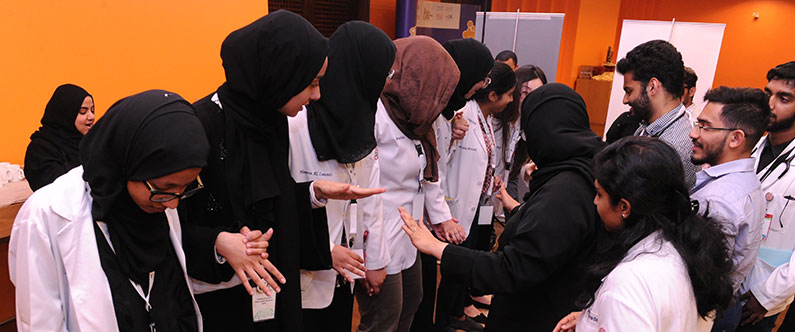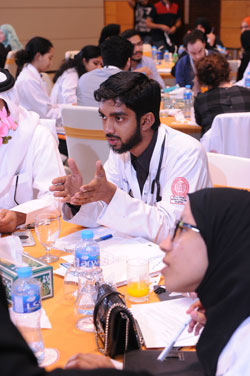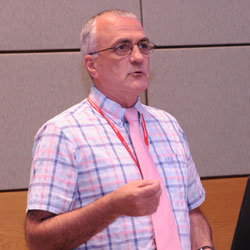WCM-Q, HBKU and WISH unite to promote patient safety
 Students at the patient safety event took part in a team-building exercise in which they had to balance on a teeter-totter, or see-saw, without breaking eggs placed underneath at each end.
Students at the patient safety event took part in a team-building exercise in which they had to balance on a teeter-totter, or see-saw, without breaking eggs placed underneath at each end.
The crucial role of effective communication and teamwork in ensuring patient safety was discussed at an immersion program coordinated jointly by Weill Cornell Medicine-Qatar (WCM-Q), Hamad Bin Khalifa University (HBKU) and the World Innovation Summit for Health (WISH).

The five-day immersion program, held at the HBKU Student Center and accredited by both QCHP and ACCME, brought a team of experts from the US-based Academy for Emerging Leaders in Patient Safety to Doha to deliver their world-renowned patient safety program. The program was attended by healthcare leaders, educators, and medical students wishing to broaden their knowledge of patient safety and risk reduction.
The event, which marked the second time the Academy for Emerging Leaders in Patient Safety has visited Doha, was co-sponsored by the Ministry of Public Health and WCM-Q, and supported by MedStar Health, a U.S.-based not-for-profit healthcare organization.
Patient safety is a field of medical research that has garnered much attention since a landmark paper was published in 1999 by the Institute of Medicine (IOM) by the title of “To Err is Human” which suggested that as many as 98,000 people die in U.S. hospitals each year as a result of medical errors.
Opening the conference, Dr. Amine Rakab, assistant dean for clinical learning at WCM- Q, said: “WCM-Q is firmly committed to delivering a robust curriculum that promotes patient safety education to our medical students starting from the first year of medical school. We strongly believe that medical students can be a driving force to change the culture of healthcare organizations to one focused on continuous improvement in patient safety, based on the very best research available.”
The first two days of the conference were aimed at faculty members and practicing healthcare professionals, while the final three days were aimed at students. Speakers at the conference discussed case studies in which medical errors occurred, explained how games and role playing exercises can help healthcare providers develop problem-solving skills, explored the role of care givers and family members in patient communication, and discussed concepts of shared accountability and transparency. The speakers also addressed issues such as informed consent, shared decision-making, indicators of improved patient safety within institutions, and barriers to transparency and the reporting of medical errors, among other topics. Participants also had the chance to develop their teamwork skills by taking part in a teeter-totter, or see-saw, exercise.

Dr. Rakab said: “Creating a culture of patient safety amongst our medical students is a top priority. The barriers to patient safety are often the fear of punishment for reporting errors, the lack of systemic analysis of mistakes, and inadequate communication and teamwork. WCM-Q’s curriculum, in conjunction with this immersion program, teaches our students to recognize unsafe conditions, systematically report errors and near misses, and empowers them with the knowledge, tools and techniques necessary to lead change at their home institutions.”
Dr. David Mayer, vice president of quality and safety for MedStar Health, said: “I think in the last 15 years we have realized more and more that providing care for patients and their families carries inherent risk. Because of this, good people working with the best of intentions can sometimes unintentionally cause harm to their patients. Our aim is to foster collaborations and share techniques and strategies that allow those who take care of patients to work more safely and put processes and systems in place that help protect patients from these inherent risks. We at the MedStar Health Institute for Quality and Safety are excited about working with WISH, Qatar Foundation and WCM-Q to make care safer for the communities we serve.”
Fatima Al-Maddid, a fourth-year medical student at WCM-Q, said: “The opportunity to engage in this conference on patient safety has allowed us as students to grow as individuals within the system. I am excited that we have these conversations early on in our careers, which is something that our training at WCM-Q does and that this conference enhances. This, coupled with the inter-professional team of healthcare personnel at the conference, means that we as a group understand the centrality of the patient in healthcare. This appreciation of the patient-first approach is something we can all take away from the three days of talks, case analysis and simulations.”